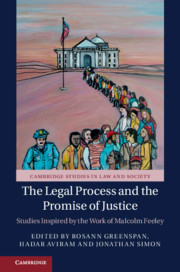Book contents
- The Legal Process and the Promise of Justice
- Cambridge Studies in Law and Society
- The Legal Process and the Promise of Justice
- Copyright page
- Contents
- About the Contributors
- Introduction: Past as Prologue
- Part I The Process Is the Punishment
- Part II Court Reform on Trial
- Part III Judicial Policymaking and the Modern State
- 10 Judicial Deference in the Modern State
- 11 The Law of the Workplace
- 12 Administrative “States” of Judicial Policy on Gender-Motivated Violence
- 13 Can Courts Abolish Mass Incarceration?
- 14 Policy-Making by Out-of-Court Settlements: Palestinian Informers at the Israeli High Court of Justice
- Part IV Political Liberalism and the Legal Complex
- Index
- Books in the Series
- References
10 - Judicial Deference in the Modern State
from Part III - Judicial Policymaking and the Modern State
Published online by Cambridge University Press: 18 April 2019
- The Legal Process and the Promise of Justice
- Cambridge Studies in Law and Society
- The Legal Process and the Promise of Justice
- Copyright page
- Contents
- About the Contributors
- Introduction: Past as Prologue
- Part I The Process Is the Punishment
- Part II Court Reform on Trial
- Part III Judicial Policymaking and the Modern State
- 10 Judicial Deference in the Modern State
- 11 The Law of the Workplace
- 12 Administrative “States” of Judicial Policy on Gender-Motivated Violence
- 13 Can Courts Abolish Mass Incarceration?
- 14 Policy-Making by Out-of-Court Settlements: Palestinian Informers at the Israeli High Court of Justice
- Part IV Political Liberalism and the Legal Complex
- Index
- Books in the Series
- References
Summary
In stark contrast to the ideal of an impartial judge who reaches a decision by impassively applying the law to the facts of a case, decades of research on judicial decision-making show that judicial reasoning is in reality affected by judges’ political views and attitudes, by strategic considerations, and by historical and cultural factors. Attitudinal theorists emphasize the impact of judges’ ideological values on judicial decision-making and point out that, especially where law is ambiguous, partisan voting tends to influence judicial thinking (Epstein, Landes, and Posner 2013; Pritchett 1948; Segal and Cover 1989). Strategic choice scholars qualify the attitudinal model by arguing that judges take into account the preferences of their colleagues, elected officials, and the public, in part to minimize the likelihood that their decisions will be overturned (Epstein and Knight 1998; Wahlbeck, Spriggs, and Maltzman 1998; Epstein and Knight 2000).
- Type
- Chapter
- Information
- The Legal Process and the Promise of JusticeStudies Inspired by the Work of Malcolm Feeley, pp. 193 - 214Publisher: Cambridge University PressPrint publication year: 2019
References
References
Cases
Burlington Industries v. Ellerth, 524 U.S. 742 (1998).
Costello v. Wainwright, 397 F. Supp. 20, M.D. Fla. (1975).
Faragher v. City of Boca Raton, 524 U.S. 775 (1998).
Furnco Construction v. Waters, 438 U.S. 567 (1978).
Grubb v. W.A. Foote Memorial Hospital, Inc., 741 F.2d 1486 (6th Cir. 1984).
Hudson v. Palmer, 468 U.S. 517 (1984).
Turner v. Safley, 482 U.S. 78 (1987).
Verniero v. Airforce Academy School District No. 20, 705 F2d. 388, (10th Cir. 1983).
Widmar v. Sun Chemical Corp., 772 F.3d 457, 464 (7th Cir. 2014).
Wolff v. McDonnell, 418 U.S. 539 (1974).

